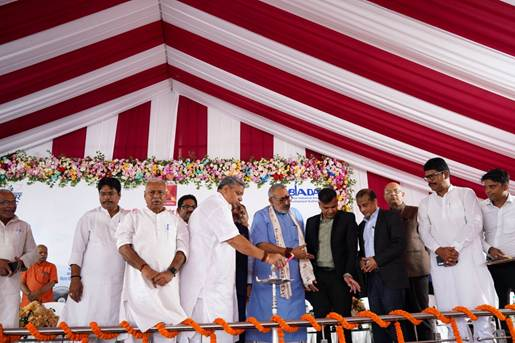NIFT Patna, ABFRL Join Hands to Empower Bihar’s Rural Women in Textiles
The agreement was formalized in Patna in the presence of Union Minister of Textiles, Shri Giriraj Singh, marking a significant leap in academia–industry collaboration for inclusive growth.

- Country:
- India
In a landmark initiative aimed at transforming Bihar’s textile landscape and empowering rural women, the National Institute of Fashion Technology (NIFT) Patna, under the Ministry of Textiles, signed a Memorandum of Understanding (MoU) with Aditya Birla Fashion and Retail Limited (ABFRL). The agreement was formalized in Patna in the presence of Union Minister of Textiles, Shri Giriraj Singh, marking a significant leap in academia–industry collaboration for inclusive growth.
Bridging Skill Development with Employment
At the heart of this initiative lies the vision of linking skill training with guaranteed employment. The MoU ensures that rural women, popularly known as Jeevika Didis—members of Bihar’s celebrated self-help groups (SHGs)—will receive industry-relevant training in garment manufacturing, machinery handling, and quality control at NIFT Patna’s extension centers.
Upon successful completion of training, the women will gain direct access to jobs at ABFRL’s new textile manufacturing unit in Begusarai district. This creates a seamless pathway from grassroots skill-building to sustainable industrial employment, a model rarely seen in India’s rural development programs.
Union Minister Shri Giriraj Singh praised the initiative, saying:
“NIFT Patna has already conducted successful training programs for Jeevika Didis, improving their stitching skills and income. With this MoU, these women will now directly enter formal industry jobs at ABFRL’s factory. Initially, 3.5 lakh women in the region will benefit, with scope to expand to adjoining districts in the future.”
Jeevika Didis: Backbone of Bihar’s Rural Empowerment
The Jeevika Didis are the driving force behind Bihar’s Jeevika programme, implemented by the Bihar Rural Livelihoods Promotion Society (BRLPS) with support from the Government of India and the World Bank. Over the years, the programme has mobilized more than 1.4 crore women into SHGs, enabling them to access microfinance, diversify incomes, and enhance social standing.
This MoU gives the Jeevika movement a new industrial dimension—elevating women from local entrepreneurial ventures to formal roles in India’s organized textile economy. It also underscores the evolving role of women in Bihar’s development story, from micro-enterprise leaders to industrial workforce contributors.
Academia–Industry Synergy for Inclusive Growth
By combining NIFT’s academic expertise with ABFRL’s industrial scale and market insight, the collaboration is designed to ensure that training outcomes directly align with industry needs. This reduces the gap between education and employment, while also providing a scalable template for replication across other states.
ABFRL, one of India’s largest fashion and retail giants, brings to the table its state-of-the-art textile production practices and global supply chain experience, ensuring that the women trained are industry-ready from day one. This collaboration is expected to set a precedent for future partnerships between national institutions and private corporations to advance women-led growth.
Wider Economic and Social Impact
Beyond immediate job placements, the programme is expected to trigger long-term socio-economic change:
-
Financial independence for women, reducing household economic vulnerability.
-
Enhanced decision-making power and social dignity for rural women.
-
Industrial growth in Bihar, with Begusarai emerging as a textile hub.
-
Employment multiplier effects for the broader local workforce, including men and youth.
-
Strengthening of India’s Make in India and Aatmanirbhar Bharat vision by integrating rural collectives into formal industry.
The industrial unit at Begusarai, supported by ABFRL, will further boost Bihar’s textile and apparel sector, attracting investments and creating a cluster effect that could inspire similar ventures in other districts.
A Blueprint for Replicable Development
This initiative exemplifies how government vision, academic excellence, and private industry leadership can converge to build models of development that are not only inclusive but also scalable. By placing rural women at the center of Bihar’s industrial growth story, the project highlights the transformative power of skill development linked with assured livelihoods.
It also signals a broader shift in India’s rural economy: from dependence on subsistence agriculture and informal enterprises to integration with high-value, globally connected industries.
The MoU between NIFT Patna and ABFRL represents a pioneering step for women’s empowerment in Bihar, offering rural women a direct bridge to formal employment in the textile industry. By combining skills training, industrial opportunities, and social empowerment, it sets the stage for Bihar to emerge as a vibrant hub of inclusive and sustainable textile production, while inspiring similar partnerships across the country.










